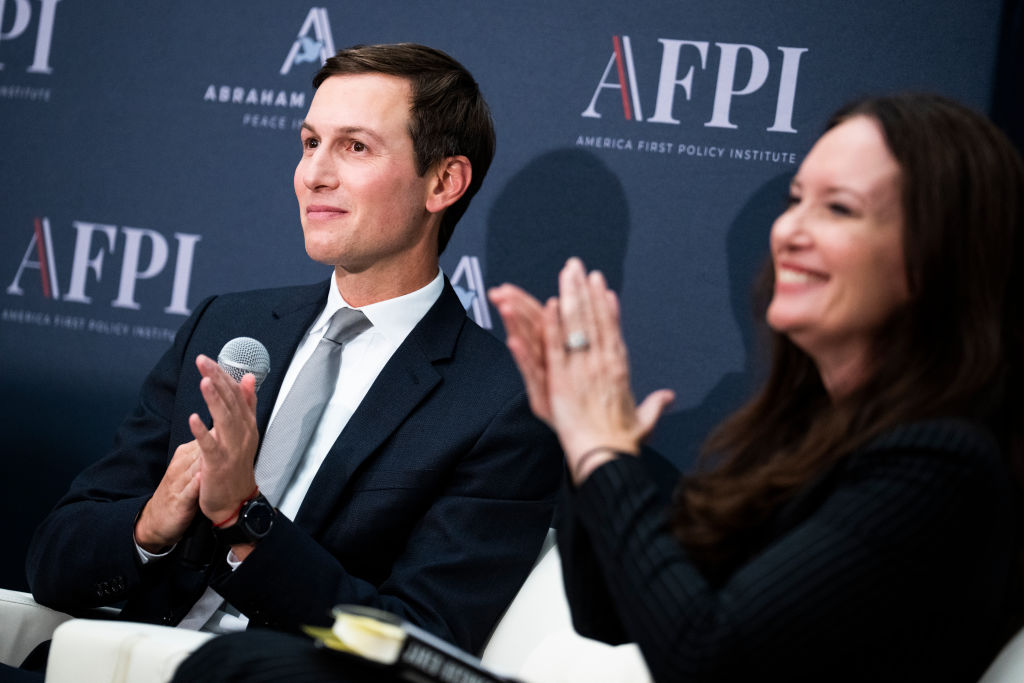
In a packed conference room on the fourth floor of an office building on Pennsylvania Avenue, a few blocks from the White House, an alternate version of Washington was playing out on Monday, one where Donald Trump’s legacy is uncomplicated by his hoarding of classified documents or his refusal to concede an election loss and foment a violent siege of Congress.
Over box lunches and embossed folders filled with policy papers, a group of the former President’s foreign policy advisers had gathered to mark two years since the launch of the Abraham Accords, an initiative to improve economic and diplomatic ties between Israel and a handful of Arab states and ease decades of antagonism over Israel’s treatment of Palestinians.
Jared Kushner, Trump’s son-in-law and a close advisor during the Trump administration, spoke on a stage about how he quarterbacked the effort to convince countries like the United Arab Emirates, Bahrain and Morocco to formalize their diplomatic ties with Israel and ease trade barriers. Dozens of copies of Breaking History, Kushner’s recently published book about his time in the Trump White House, were on display on a table outside the room.
The event was hosted by the America First Policy Institute (AFPI), a think tank set up by former Trump administration officials to promote the domestic and foreign policy ideas from the Trump administration so they can be advanced by a Trump-aligned Congress or a future administration.
As Kushner praised the Trump administration’s work in the Middle East, he did not touch on the multiple investigations into the former President, including the one into Trump’s taking of thousands of pages of sensitive government documents with him to Florida when he left the White House; or the scrutiny he continues to face over efforts by his allies to set up fraudulent sets of fake electors to overturn the legitimate election results; or the ongoing work of the Jan. 6 committee, which is exploring Trump’s role in efforts to violently stop the counting of electoral college votes so Trump could stay in power. Late Monday, the New York Times reported that the Department of Justice had issued about 40 subpoenas over the past week seeking information about the actions of Trump and his associates related to the 2020 election and the Capitol attack.
Read more: Trump’s Legal Liability Grows Clearer With Latest Court Filing
Kushner’s appearance coincided with a flurry of speculation over why Trump had arrived unannounced in the Washington, D.C. area on Sunday night, with some of Trump’s critics guessing that the seemingly abrupt visit was a sign of his worsening legal troubles. Trump wrote on his social media platform Truth Social on Monday that he was in the area “working” at the golf club he owns in Virginia. “Working today at Trump Washington DC on the Potomac River. What an incredible place!” Trump wrote.
Kushner described the investigations into Russia’s election interference and Trump’s effort to pressure Ukraine to investigate Joe Biden as distractions from work he was trying to get done.
“I wrote in the book a lot about the investigations and attacks and what it was like to be in that environment,” Kushner said. “In Washington, it is kind of like a time-duration game, in the sense that you have to accomplish everything you can while you have the opportunity and the other side is doing everything they can to either frustrate you, attack you, stall you.”
“You have to figure out, how do you keep your eye on the prize and get there,” he added.
Kushner’s talk and the panel discussion that followed were part of a broader effort to continue the Trump administration’s policy goals, even if Trump himself doesn’t win back the presidency, says Marc Lotter, the spokesman for AFPI and the director of strategic communication for Trump’s 2020 campaign. The work of the institute is designed to “highlight the successes that we had but also set the stage for the next America First Administration and or leadership whether that’s in Congress or hopefully in the White House as well,” Lotter says. “We are preparing the groundwork for any candidate that wants to pick up the America First mantle.”
Kushner lamented that the Abraham Accords had not formally brought in more Muslim countries, although the Biden administration has largely embraced them, one of the few policy areas in which Biden has not worked to reverse the previous administration’s accomplishments.
While Trump did not attend his son-in-law’s speech, the former President was still a topic of conversation. During a panel discussion after Kushner’s remarks, Robert O’Brien, Trump’s final national security advisor, recalled telling Trump that the work he did in the Middle East and other regions would make him remembered as a “peacemaker.” O’Brien repeated that to Trump on Trump’s last day in office, weeks after Trump had encouraged an armed mob to march toward the Capitol. O’Brien said he was one of the people saying goodbye to Trump as he left the White House on January 20, 2021. At that moment, O’Brien again brought up his line about Trump being known as a “peacemaker.” “Do you remember when I said that? O’Brien recalled. “He said, ‘Well, you may be right.’”
More Must-Reads from TIME
- Why Biden Dropped Out
- Ukraine’s Plan to Survive Trump
- The Rise of a New Kind of Parenting Guru
- The Chaos and Commotion of the RNC in Photos
- Why We All Have a Stake in Twisters’ Success
- 8 Eating Habits That Actually Improve Your Sleep
- Welcome to the Noah Lyles Olympics
- Get Our Paris Olympics Newsletter in Your Inbox
Contact us at letters@time.com